
COP26: India, the world's fourth-largest auto market On Wednesday pledged to expedite the transition to zero-emission vehicles (ZEVs) in its markets, with Rwanda and Kenya, at the United Nations Climate Change Conference (COP26).
In addition, 30 countries, including Canada, the United Kingdom, and Mexico, as well as six major automakers, including Ford, Mercedes-Benz, General Motors, and Volvo, have promised to work together to make zero-emission vehicles the new normal by 2030 or sooner. This is a huge step forward for automobiles that do not release harmful emissions to the environment or public health.
At COP26, 20 airline participants of the World Economic Forum's Target True Zero programme committed to using innovative technologies to combat climate change, such as electric, hydrogen, and hybrid aircraft. And the creation of a new World Bank trust fund to decarbonize road transport in emerging markets and developing economies, which will raise $200 million over the next ten years.
The Zero Emission Vehicle Transition Council (ZEVTC), which gathered with prominent representatives, including experts on the transition in Emerging Markets and Developing Economies (EMDEs), to consider how international collaboration may assist a worldwide transition, is guided by this purpose. The ZEVTC will release its first annual Action Plan, which identifies opportunities for long-term international cooperation to speed up the transition by 2022. The United States joined the United Kingdom as a co-chair of the ZEVTC on Wednesday.
China and U.S commit to improve climate cooperation at COP 26
Biden and Chinese President Xi Jinping will meet virtually next week
World should not overlook Afghanistan's dire economic situation: Federal Minister Hussain